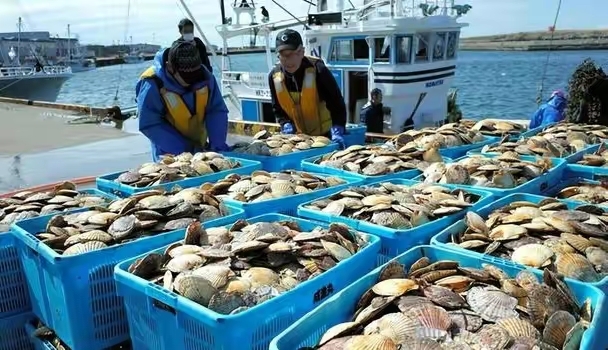
According to the Daily News of Japan on March 19th local time, the export of Japanese scallops has fallen into a very difficult situation. The report states that due to China's long-term cessation of importing Japanese aquatic products, Japanese scallops are facing an unsolvable dilemma. Despite efforts by the government and aquatic industry practitioners to expand the export market, Hokkaido, which accounts for 80% of Japan's scallop production, has no place to export.
This situation has attracted widespread attention in the international trade circle and sparked people's thinking about environmental protection and trade policies.
According to a report from the Ministry of Agriculture, Forestry and Fisheries of Japan, China has always been the largest exporter of Japanese aquatic products, with scallop exports ranking first among all categories with a value of 48.9 billion yen in 2022. Nearly half of the scallops exported from Japan to overseas, approximately 143000 tons, are sold to China. Among the 96000 tons of frozen scallops with shells, 30000 to 40000 tons are processed in China and then exported to the United States.
Some media sources have expressed that seeing such news from Japanese media can be said to be somewhat unexpected. After all, Japan's public statement proves that its scallop exports have indeed reached an unsustainable level. And for Japan, this can only be described in one sentence, which is karma. Japan will eventually taste the consequences of its actions and pay the price.
On August 24, 2023, Tokyo Electric Power Company officially launched the Fukushima nuclear contaminated water discharge plan, which is expected to discharge for 30 years.
This action by Japan has attracted worldwide attention and strong protests, as nuclear pollution poses a huge threat to the environment and human health. In the afternoon of that day, the General Administration of Customs of China issued a notice to comprehensively prevent the radioactive pollution risk caused by the discharge of contaminated water from the Fukushima nuclear power plant in Japan to food safety, protect the health of Chinese consumers, and ensure the safety of imported food. Starting from today, the import of Japanese aquatic products will be completely suspended.
The current situation faced by the export of seafood, especially scallops, is one of the costs spread by Japan for its stubbornness, and the more serious consequences will be revealed one by one in the future.
According to reports, the fourth batch of nuclear contaminated water will continue to be discharged into the sea from February 28th to March 17th, with an estimated total discharge of around 7800 tons. Since August 24th last year, Japan has been discharging contaminated water from the Fukushima Daiichi nuclear power plant into the sea. So far, three batches of contaminated water have been discharged, with a cumulative discharge of approximately 23400 tons.
The main reasons for Japan's aquatic exports reaching this level are as follows:
Firstly, the discharge of nuclear contaminated water. Although the West has remained silent under the "white washing" of the United States, there are almost no countries that truly welcome the import of Japanese seafood, and they have lost a considerable portion of the market.
With the increasing global attention to environmental issues, scallops, as a member of marine organisms, rely on clean marine water quality and a good marine ecological environment for their reproduction and survival. However, in recent years, the scallop farming industry in certain regions of Japan has been questioned due to overfishing, water pollution, and other issues, which has led countries to have concerns about scallops imported from Japan.
Secondly, there have been changes in trade policies. In international trade, each country has its own trade policies and standards. However, in recent times, some countries have put forward stricter requirements for food safety and quality, and the inspection standards for imported scallops have become more stringent, which has led to more scrutiny and restrictions on Japanese scallop exports. These restrictions make it difficult for Japanese scallops to enter some important markets, which is undoubtedly a huge blow for exporters.
In addition, Fumio Kishida's subsidies to the fishing industry have also tolerated these fishermen. Most of them actually don't have to worry about export issues and can still survive, so these fishermen don't have the motivation to change the status quo.
On the Japanese side, they have also been striving to find opportunities. In addition to exploring the possibility of establishing scallop processing points in Vietnam and other countries, on February 19th, Sakamoto Tetsuchi also invited ambassadors from six ASEAN countries, including Thailand, to visit the Toyosuka market located in the eastern district of Tokyo to vigorously promote Japanese scallops.
However, for countries facing the sea, these seafood products are actually saturated; For a few countries with a demand, there are concerns about excessive nuclear radiation. Therefore, the bitter fruit of Japan's unauthorized discharge of nuclear contaminated water may have to be tasted slowly by itself in the days to come.

Recently, a major piece of news has emerged in the US political arena: The Trump administration is considering passing an executive order to reclassify marijuana from a federally controlled drug to three categories, aligning its regulatory standards with those of prescription painkillers such as Tylenol containing codeine.
Recently, a major piece of news has emerged in the US polit…
Against the backdrop of the Federal Reserve's third rate cu…
Recently, according to Xinhua News Agency, Bolivian Foreign…
President Trump's political career has consistently defied …
On December 15, 2025 (local time), former U.S. President Do…
Recently, a report by Bloomberg has pushed the global techn…